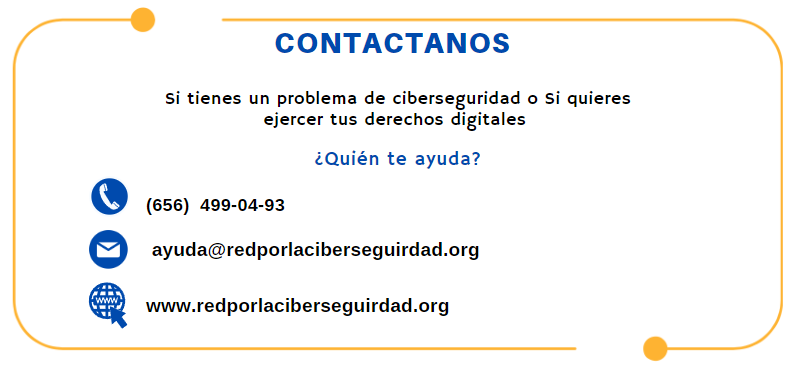3. How to deal with online extortion?

Online Extortion
Internet extortion is the way of asking for a “ransom for your information” extracted through malware by another person, that is, a malicious computer program is infiltrated into your computer, so that a payment or some other demand is previously requested to recover said stolen information.
Malware can be contracted for several reasons, an example is by downloading a file from untrustworthy sources, installing some free software that is already infected, visiting malicious websites, clicking on a link and/or causing the entry to malware.
Every type of electronic device is prone to such an infection, such as a mobile phone, a computer, a tablet, even a video game console, if the device has access to the internet it is vulnerable to a cyber attack.
What types of extortion exist?
It is very important to be careful what we click on, there is a lot of evil, among the various most famous online extortions are:
Grooming
It is sexual harassment and abuse, the so-called “pedophile deception”. They are actions of an adult through the Internet to deceive a minor for sexual purposes.
The underage person is extorted to access sexual demands, which increase under the threat of revealing said content.
The attackers are pedophiles or pedophiles who approach the minor through a means of communication on the Internet, establishing an emotional bond to obtain photographs or videos, or directly stealing photographs.
Sharenting trick
Sharenting is an action by the father and mother figure when sharing information about their children on social networks, it does not have a malicious intention, on the contrary, the intention of the parents is to share the “emotion” and how “proud” they are. They are their children, however, this action has a responsibility, firstly you do not know if your children agree, secondly, most children still do not understand anything they publish.
It is likely that you are making your child vulnerable to fraud, password theft, or even financial risk, but it is not the only risk. By having so many photos and information on the network, an outsider could impersonate you. by close friends, family of the minor to deceive a person.
Sexting
As its name indicates, it deals with sexual content, in which two people exchange sexual videos or photos, and one party threatens to show them to the public, friends or family with the intention of getting something.
Ransomware
This type of malware prevents a user from accessing their operating system or any personal files, and then requests a ransom to access them again.
What should you do?
In any situation, it is advisable to follow the following steps:
Step 1: Keep calm and do not take hasty actions.
Step 2: Do not delete anything, this is to maintain evidence of the extortion.
Step 3: Do not respond, maintain zero communications with the attacker.
Step 4: Do not negotiate, so as not to be a victim of manipulation.
Step 5: Ask the Police for help, the following is a catalog for help:
Step 6: Turn off your device (mobile or computer).
Step 7:If possible, change all your passwords.
Step 8:Restore your information from a backup
Prevent before sorry!
It's time to start having digital civility. Small actions make a difference, for example;
- Avoid entering suspicious websites
- Have an antivirus installed on your device
- Do not open email from dubious origin (in this case it is better to investigate who the email is from before opening any link or downloading any file).
- Do not accept anyone's friend request.
- Do not keep in contact with strangers or at least do not trust what they send us.
- Check the domain of a site to verify that it is the official site.
- Ask for help, if you need it, from the authorities, to sue the attackers.
- Take care of the information you share.
- Cover the camera of your computer and/or cell phone with tape.
bibliographic references
- Movistar Prosegur Alarmas 2022, https://blog.prosegur.es/intenta-hacerme-chantaje-online/
- Guest Author(2019) 4 tipos de fraudes por Internet que debes conocer para no caer en el engaño
- https://ciberseguridad.ift.org.mx/reporte_ciudadano.php

